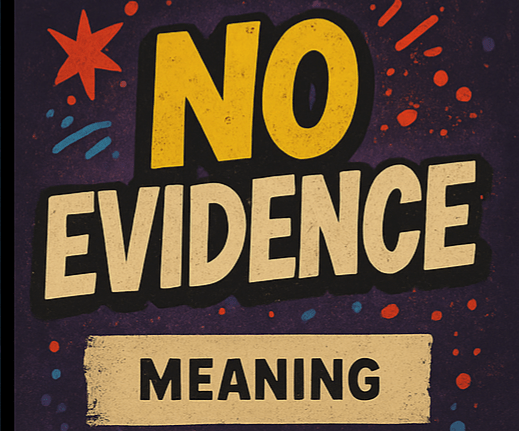
Slangs in Nigeria’s streets, particularly on TikTok and X (previously Twitter), are no longer only for vibes; they increasingly reflect lifestyle, philosophy, and even survival strategies. The phrase “No Evidence” has recently gained popularity as a sarcastic, bold, and fun manner of deflecting culpability or denying clear conduct.
This slang is usually used with ” No evidence you go go explain tire”. Whether it’s a cruise or a real-life controversy, once you say “No Evidence,” everyone can relax.
What Does “No Evidence” Mean?
In simple terms, “No Evidence” means:
• You cannot prove it.
• It didn’t occur because you didn’t capture me.
• You talk, but where is the receipt?
• No proof means no case.
It’s the type of answer people today use to justify themselves (usually playfully) after doing something shady, funny, or questionable. Even if there is a strong suspicion, as long as there is no physical proof, video, audio, or screenshot, the person will simply state, “No evidence.”
For example:
• Did someone consume your food and then deny it? ← “No evidence.”
• When you see your friend with someone else’s babe, he smiles and says: “No evidence.”
• Is there a TikTok comment section chastising someone for bad behavior? Fans responded, “But no evidence sha .”
Where it blew up from
“No Evidence” had been circulating in Nigerian street chatter for years, but it gained significant traction on TikTok between late 2023 and early 2024. Skit creators, meme lords, and Generation Z Twitter users transformed it into a digital culture. Many content makers began using it as a punchline when caught on cruise or trying to avoid accountability.
Voiceover clips, such as:
“They say I am, but where is the evidence?!”
went viral, being utilized in skits, meme edits, and even song promotions.
TikTok and Meme Culture Carried It Heavy.
TikTok, like most modern Naija slang, made “No Evidence” a household line. The phrase spawned an entire genre of video, with guys filming themselves appearing guilty but rejecting it with a bold “no evidence,” and beauties using it to dismiss dating rumors with small wicked giggle.
Some even use it as a caption when publishing dubious photographs or connecting with controversial friends.
Example:
“Before you talk rubbish, remember — no evidence .”
How Nigerians Use It in 2025
• When caught doing something humorous or bad, Cruise says, “You don’t see me, abeg no evidence.”
• As a defense, whether someone accuses you online or offline, say, “Go show proof first. “No evidence, no talk.”
• As Shade: To disregard gossip or chatter about someone: “They say this guy did a bad thing yesterday. But no evidence, sha.”
• In music and skits, artists and comedians are now incorporating “No Evidence” into street anthem lyrics and punch lines.
Why it’s so relatable
In Nigeria, where people are constantly attempting to avoid being accused or dragged online, this lingo has become a digital shield. It provided everyone, from the streets to celebrities, with a quick, humorous method to relieve tension and avoid trouble.
It’s also a Gen Z way of saying “talk your talk, but I no dey shake.” Even if caught red-handed in vibes, simply say:
“No evidence”, and the case becomes soft.
Conclusion
“No Evidence” is no more just a slang term; it has become a mindset and defense mechanism for Nigerians, particularly in this modern age with screenshots and receipts. It embodies the cruise culture, daring, and anarchy that Gen Z Naija lives by.
So the next time you notice something strange or someone calls you out, don’t say too much. Simply smile, raise your hand, and say:
“Omo… No Evidence.”

Leave a Reply